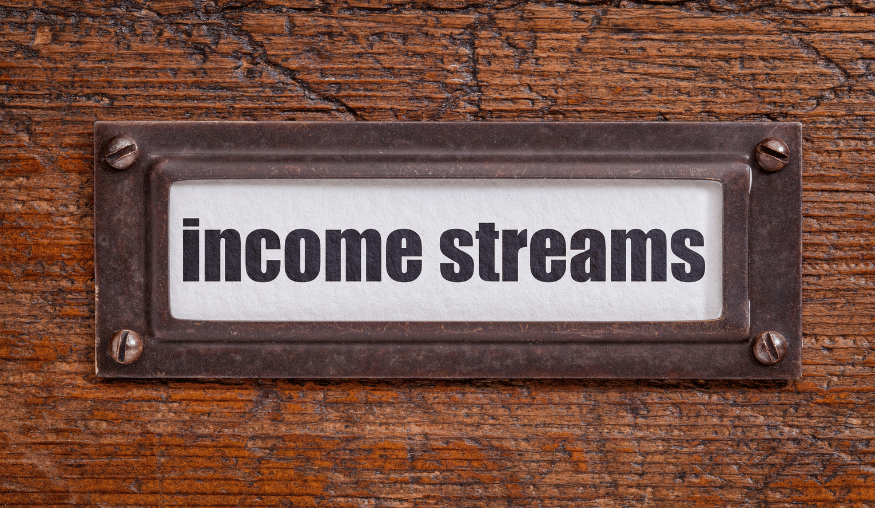If you hang out in the parts of the internet we do, you’ve probably heard of the FIRE movement. Financial independence; retire early.
Sounds nice, huh?
But whether you’re a traditional retiree, planning to become one, or hoping to cash out and hit the beaches at the ripe old age of 35, you’re going to need something: reliable income streams.
Check out this data from the Census Bureau:
“Okay, so where’s that money coming from?”
We’re here to help.
Option One: Stonks
Securities like stocks and mutual funds might be a little boring, but they’re also the classic choice. And for good reason: collecting well-diversified investment vehicles that allow you to capture value from the market without putting your eggs in one basket is a time-tested approach.
But it’s not the only approach, and it certainly isn’t the only thing a well-rounded portfolio needs. We’ll let the S&P speak for itself on this one:
Over the long haul, tracking the market is a great way to grow your nest egg. But selling stocks isn’t always a viable income stream for retirees, because . . . what if you retire in 2006, and need to liquidate stocks in 2008?
Strategic withdrawal helps mitigate that risk, but only if you’ve got a well-diversified portfolio and a well-considered, tactical approach.
That leads us to
Option Two: Dividend-Bearing Stonks
The upside with dividend stocks is that they’re actually cash-flowing. Hold the stock, wait for your mailbox money, profit. For retirees, this is often a better choice because it’s low-risk. Calculate your annual income needs, acquire dividend-bearing investments, and wait to smash that retire button until your payouts equal living expenses. Simple, right?
Well, not quite.
For one thing, while dividend stocks are great once all you need is passive income, they’re less effective as a way to build wealth while you’re young—when many financial advisors say it’s better to take some calculated risks.
For another, dividend stocks are often less volatile, and therefore less likely to grow in value, than their counterparts. If you’re looking to buy, hold, then earn an appreciation payout when you sell, lots of dividend stocks aren’t quite the right move.
Finally, on a more technical note, dividend stocks can be tax-inefficient. That’s because dividends are usually taxed as income. (Well, that’s technically an oversimplification; check out this shiny hyperlink for the nerdy details.)
We’re getting ahead of ourselves a little here, but real estate investments are often tax-advantaged—meaning investors get to hang on to more of their returns.
Still, dividend stocks can be a great option. But they’re not all you’ll need. It’s also nice to have
Option Three: Your Employer’s Money
Great news: chances are, your employer has a bunch of money lying around. More great news: you can get a bigger slice of that money than just your paycheck.
If you’re planning for retirement, you should be looking for ways to expand your slice of that pie. The best way to do this is: get a pension. These can be hard to come by these days (insert obligatory “back-in-my-day” line), but if you can find a job that offers one, it’s a great income stream for retirees.
If your employer offers 401(k) matching, then you should absolutely prioritize maxing out your contributions. It’s literally free money, and—especially after a few decades of growth—it’ll come in handy when you’re sipping tropical beverages on a white-sand beach.
Option Four: Safe(ish) Mailbox Money
As the old saying goes, “don’t knock Social Security until you’ve tried it.” Okay, that might not be quite right.
But, adage or no adage, there are some comparatively low-risk options for senior retirees who need mailbox money. Annuities are one example. Bonds are another. While those low-risk investment options often aren’t the optimal approach while you’re actively trying to save for retirement, shifting part of your portfolio into low-risk options can be a useful way to mitigate risk generated by your more-volatile holdings (see Option 1) as you get older.
But you already know what our favorite is gonna be.
Option Five: Real Estate
Come on, you knew this was going to show up somewhere on the list. And boy, did we save the best for last.
There’s lots of ways to invest in real estate. And different approaches make money, and pay their investors differently.
Direct investment — buying and operating property yourself — is the hardest, but possibly the most rewarding.
But for FIRE enthusiasts more interested in traveling the world than managing rental properties, the better approach might be to let someone else do the managing, while you get checks in the mail.
We’ve written plenty of times why we think real estate is great. And we won’t recite our reasoning here. But the Tl;Dr is that real estate:
- Offers some of the best risk-adjusted returns out there;
- Gives investors access to passive income as well as appreciation; and
- Helps insulate a portfolio against recessions.
Should it be your whole portfolio? Probably not (although we can dream. . .). But it’s dangerous to go alone. You should take real estate with you.

